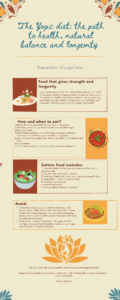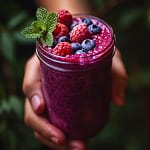Keep your food simple. Never eat too much or too little. Practice. Become your own doctor. – Swami Sivananda
 According to yogic principles, in order for our body to function optimally, it is necessary to breathe properly, exercise, relax, think positively, and eat properly. By breathing and eating, we take prana into the body, which is life force or vital energy. Prana is rich in fresh and naturally pure food. The principle of ahimsa, i.e., non-violence, is important in the yogic diet. Therefore, this diet is dairy-vegetarian.It includes cereals, legumes, fruits and vegetables, nuts and seeds, and homemade dairy products, but excludes meat and meat products.
According to yogic principles, in order for our body to function optimally, it is necessary to breathe properly, exercise, relax, think positively, and eat properly. By breathing and eating, we take prana into the body, which is life force or vital energy. Prana is rich in fresh and naturally pure food. The principle of ahimsa, i.e., non-violence, is important in the yogic diet. Therefore, this diet is dairy-vegetarian.It includes cereals, legumes, fruits and vegetables, nuts and seeds, and homemade dairy products, but excludes meat and meat products.
Preparation of yogic diet
According to the yogic principles described in the book “Yoga Cookbook: Vegetarian Diet for Body and Soul”, it is best to always use fresh foods without preservatives and flavor enhancers because such foods contain the most prana and nutrients that benefit your body and mind.It is best to eat raw food, i.e., food in its original, fresh form, and steamed or stewed food. Frying food is not recommended, especially not in deep fat.
Fill half of the stomach with food, a quarter with water, and leave the remaining quarter empty for gas. Start the day by consuming a little lemon juice mixed with honey. It will encourage blood cleansing. After a meal, you can sit on the heels of your knees (vajra asana) and stay in that position for about 10 minutes. This will help the food break down faster. Introduce one day of fasting a week. This will encourage detoxification of the body and allow the organs to rest.
How and when to eat?
- Before the meal, give thanks for the food in front of you.
- Eat when you are in a good mood and when you feel hungry.
- Eat simple meals.
- Eat in silence, and if you are with family, encourage a pleasant conversation-it will have a positive effect on digestion.
- Add one raw dish to each meal—this will stimulate the alkalinity of the body.
- Don’t overeat.
- Do not drink liquids during meals, as this can cause indigestion.
Food for strength and longevity
Yogic food contributes to the clarity of the mind and the health of the body, which is a prerequisite for the spiritual development of a person. So-called sattvic foods (sattva = virtue, purity) are used; they are fresh, “clean” and grown without fertilizers and pesticides. Such foods promote joy, strength, and vitality.

Sattvic food includes:
1. Cereals (wheat, barley, rye, corn, quinoa, millet, oats) = carbohydrates
You can eat them in the form of bread or porridge. Cereals supply the body with carbohydrates, which are the main source of energy. They also contain amino acids needed for protein synthesis.
2. Legumes, nuts and seeds = protein
The best sources of protein for vegetarians are legumes, as well as seeds and nuts. Legumes include different types of beans: beans, chickpeas, lentils, peas, soybeans. The amount of protein-containing foods should not exceed a quarter of the total amount of fruits and vegetables in the meal. Don’t eat too much protein because excess, in addition to burdening the liver and kidneys, causes severe illness.
3. Fresh and dried fruits, fruit juices = vitamins, minerals, fiber
Fruit, whether fresh or dried, is a very important part of the yogic menu. Fresh fruit juices supply your body with vitamins, minerals, and fiber, and at the same time cleanse the blood thanks to the alkaline substances they contain.
4. Vegetables = vitamins, minerals, fiber
Leafy, root, and tuberous vegetables, as well as seeds-containing vegetables like pumpkin and cucumber, are recommended.
Vegetables should be steamed or eaten raw.
5. Herbal spices and teas
6. Natural sweeteners
7. Dairy products (domestic, organic)
Here the emphasis is on homemade milk, cheese, butter, and yogurt. Because industrially processed milk contains hormones and antibiotics, the products obtained in this way are not recommended for consumption. You can also replace industrial milk with a plant-based variant. Be sure to consume dairy products in moderation as they stimulate the production of mucus.
Avoid:
- Excessively bitter, salty, sour, very hot, and spicy foods (onion, garlic, coffee, tobacco) are thought to be a cause of pain and disease because they are overly stimulating, arouse passions, and stimulate negative emotions, throwing the body out of balance.
- Rotten, stale, “unclean” food (meat, fish, eggs, alcohol, overripe and unripe fruit, fermented foods such as vinegar, toasted and burnt food, mushrooms).
Read more: The Yogic Diet: A Complete Guide




